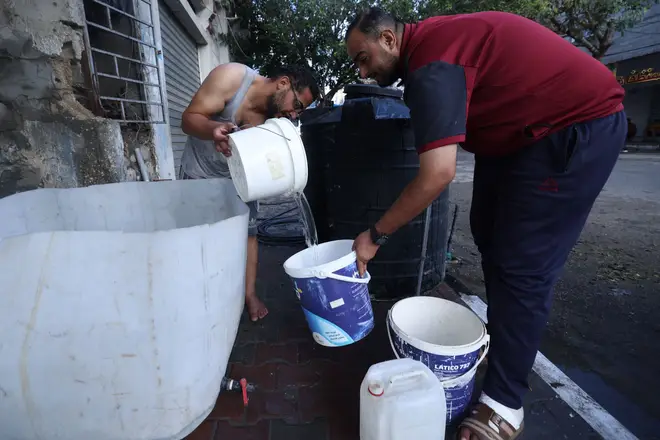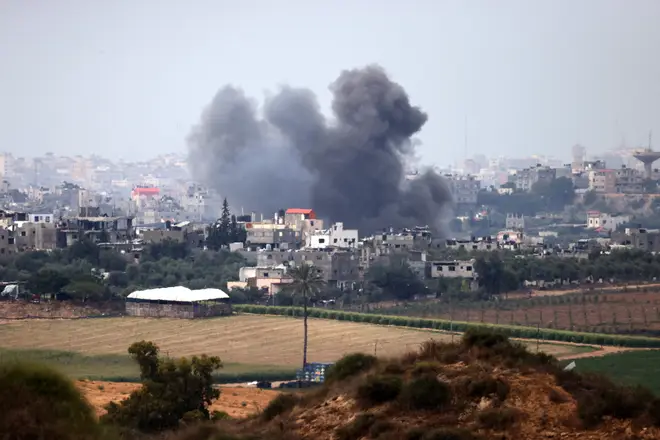
Simon Marks 3pm - 7pm
17 October 2023, 09:38

Israeli Ambassador: Hamas is using electricity in Gaza to make rockets
The Israeli Ambassador has accused Hamas of committing a "double war crime" by keeping civilians in a war zone.
Speaking to LBC's Nick Ferrari at Breakfast, Israeli Ambassador Tzipi Hotovely also accused Hamas of failing the Palestinian people in Gaza and using electricity not to supply water but instead "make rockets."
The conversation comes as the US is attempting to break a deadlock over delivering aid to millions of increasingly desperate civilians in the Gaza Strip as President Joe Biden prepared to head to the region.
Israeli air strikes continued to pound Gaza early on Tuesday, even inside an evacuation zone where Israel had told residents to gather in advance of an expected ground offensive.
Read more: British girl, 13, who disappeared in Hamas's attack on Israel has been murdered, family says
Read more: Attack on Gaza convoy that killed 70 'faked by Hamas', Israeli ambassador claims
When Nick pointed out it was Israel who cut off the power and water to Gaza, "how do you justify that," Nick asked.
The Ambassador said that Israel was "not targeting civilians" but said the Gaza Strip was totally under the control of Hamas since 2005.
"Hamas is based in schools, in hospitals, it has embedded itself with the civilians."
Ms Hotovely then said Hamas was "using the electricity in Gaza, that could have supplied water to the people of Gaza, but they are using it to manufacture rockets," which she said were then used to attack Israel.
"Blame Hamas for the fact it is using electricity, not to supply water to its people, but to fight Israel and kill innocent Jews."

Minister accuses Hamas of 'using nits own citizens to defend Hamas'
Earlier, Development Minister Andrew Mitchell told Nick: "Israel uses its defence forces to defend its own citizens, whereas Hamas uses its own citizens to defend Hamas. That to me says a great deal about what's going on."
Read more: Israel's invasion of Gaza likely 'tomorrow or in next few days', ex-Foreign Secretary tells LBC
Israel appears set to mount a major assault on the northern part of the territory aimed at rooting out Hamas.
Wounded people were rushed to hospital after heavy attacks outside the southern Gaza cities of Rafah and Khan Younis, Gaza residents reported. Basem Naim, a senior Hamas official and former health minister, reported that 27 people were killed in Rafah and 30 were killed in Khan Younis.
Israel has carried out unrelenting strikes against Hamas-ruled Gaza since the militant attack on southern Israel last week killed 1,400 people, mostly civilians.
Dozens of Israelis and citizens of other countries were taken captive and brought to Gaza by militants.
The Israeli strikes have killed at least 2,778 people and wounded 9,700 others in Gaza, according to the Health Ministry there. The strikes have not stopped Hamas militants from continuing to attack Israel with rockets launched from Gaza.
The combination of air strikes, dwindling necessities caused by Israel's blockade, and Israel's mass evacuation order for the north of the Gaza Strip has thrown the tiny territory's 2.3 million people into upheaval and caused increasing desperation.
More than 1 million Palestinians have fled their homes, and 60% are now in the approximately eight-mile area south of the evacuation zone, the UN said. Aid workers warned that the territory was near complete collapse with ever-decreasing supplies of water and medicine and with power running out at hospitals.
At the Rafah crossing, Gaza's only connection to Egypt, truckloads of aid were waiting to go into the tiny, densely populated territory, and trapped civilians - many of them Palestinians with dual nationalities - were hoping desperately to get out.

Mediators were trying to reach a ceasefire to open the border, which shut down last week after Israeli air strikes. An agreement appeared to have been reached on Monday, but Israel denied reports of a ceasefire in Rafah, which would be needed to open the gates. On Tuesday morning, they were still closed.
General Erik Kurilla, the head of US Central Command, arrived in Tel Aviv for meetings with Israeli military authorities ahead of a Biden visit planned for Wednesday to signal White House support for Israel.
Mr Biden will also travel to Jordan to meet Arab leaders amid fears the fighting could expand into a broader regional conflict as fighting intensifies along Israel's border with Lebanon.

US Secretary of State Antony Blinken, who visited Israel for the second time in a week on Monday after a six-country tour through Arab nations, said in Tel Aviv that the US and Israel had agreed to develop a plan to enable humanitarian aid to reach civilians in Gaza.
There were few details, but the plan would include "the possibility of creating areas to help keep civilians out of harm's way", he said.
In Gaza, hospitals were on the verge of losing electricity, threatening the lives of thousands of patients, and hundreds of thousands of Palestinians displaced from their homes searched for bread.
With taps dry, many rationed the little clean water available and others resorted to drinking dirty or sewage-filled water, risking the spread of disease.
The Israeli military said it was trying to clear civilians for their safety ahead of a major campaign against Hamas in Gaza's north, where it says the militants have extensive networks of tunnels and rocket launchers. Much of Hamas' military infrastructure is in residential areas.
Israel evacuated towns near its northern border with Lebanon, where the military has exchanged fire repeatedly with the Iranian-backed Hezbollah group.
Israel fought a vicious month-long war with Hezbollah in 2006 that ended in a stalemate and a tense detente between the two sides.
Speaking to the Israeli Knesset, Prime Minister Benjamin Netanyahu warned Iran and Hezbollah: "Don't test us in the north. Don't make the mistake of the past. Today, the price you will pay will be far heavier."
Soon after he spoke, the Knesset floor was evacuated as rockets headed toward Jerusalem. Sirens in Tel Aviv prompted US and Israeli officials to take shelter in a bunker, officials said.